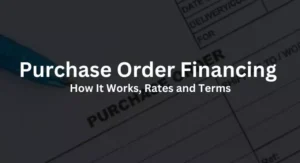
You’ll probably require a small business loan to establish or expand your firm unless it is entirely self-funded or supported by investors. Company loans, which are often provided by banks, provide a much-needed injection of cash to assist pay the majority of expenditures, yet many small business owners find it challenging to get authorized. The following details and advice should be kept in mind while applying for a business loan from a bank so that you may be accepted more swiftly and simply.
Also Read: What is vehicle insurance? A complete guide
What to consider when choosing a business bank loan
Due to the inherent safety nets present in conventional banking, business loans from banks are among the most popular types of funding for small firms. Banks, and the majority of their goods, provide guarantees that many atypical and internet banking lessors don’t since they are backed by the federal government. Furthermore, compared to loans from internet lenders, bank loans often have cheaper interest rates.
As a small company owner, you have a wide range of alternatives when it comes to business finance. One loan type may be a better match for your financial status and repayment capacity than another since each sort of loan has its own set of conditions, demands, and other needs.
You must decide precisely what kind of loan you want to obtain after determining that your small company might benefit from one in the near future. Any small firm that doesn’t comply with this risk’s wasted time, sunk expenses, and other serious problems.
The improper kind of company funding is one of the largest errors small business owners make when seeking for a loan, according to Ben Shabbat’s article for Become.co. It’s best to research all available financing options. Attempting to find a solution that may not genuinely solve your financial situation before asking for a business loan can save you time.
Common types of small business bank loans
The following are some of the most typical forms of company loans to take into account while examining prospective funding options:
Business term loan:
This loan is a standard bank loan option offered by a financial organization. In certain ways, it functions like a personal loan. When a firm needs money for significant demands like acquisitions, business renovations, or substantial expenditures, they often go for this kind of loan. These loans often have a set interest rate and the lender requires a monthly payment plan or a quarterly payment schedule, depending on the arrangement. Additionally, these loans have a set maturity date, with intermediate-term loans having a maximum period of three years and long-term loans having a maximum term of ten years.
Line of credit:
Think of a company line of credit similar to a credit card when contemplating one. Your small company may borrow money from the bank up to a particular amount if it is authorized. You only pay interest on the amount you have already consumed as debt accumulates. This choice gives you a lot more freedom in how you may utilize the money as long as you keep under that credit limit. Small companies who have a consistent cash stream, a good credit history, and in certain situations, are ready to put assets up as collateral, should definitely consider this option.
Commercial mortgage.
A commercial mortgage is the kind of loan you need if your company is trying to grow and needs to buy a new site. Similar to house mortgages, commercial mortgages are backed by liens on a business property. Let’s say you have a poor or nonexistent credit history. The bank might then demand that the owner of the firm or any principals personally guarantee the loan, guaranteeing to pay the debt in the event that the company fails. Commercial mortgages are substantially shorter than residential mortgages, which generally have terms of 30 years.
Equipment lease.
Equipment leases stretch out the expense of a large equipment purchase over a certain period of time, similar to leasing a vehicle. The majority of lessors don’t need a sizable down payment for a lease, and after the lease has ended, you may choose to either return the equipment or pay the remaining equipment worth depending on the lease’s duration and the item’s appreciation. Although the initial cost of merely buying the equipment will be cheaper, it’s crucial to keep in mind that interest will increase the cost.
Letter of credit.
A letter of credit is a bank’s assurance to a seller that they will be paid correctly and promptly. The guarantee is available in two varieties: customer protection or vendor protection. In the former, which is often provided for foreign transactions, the bank guarantees to compensate the seller in the event that the buyer defaults on their payments. Sometimes the buyer may put money aside in an escrow account up front for this kind of letter. Buyer protection is provided in the form of a fine or reimbursement to the vendor. These letters are given by banks to companies who apply for them and possess the necessary collateral or credit histories.
Unsecured business loan.
With an unsecured business loan, the borrower is not required to put up any security for the loan amount. The lender charges a substantially higher interest rate than it would for a loan secured by collateral since it is nicer to the borrower than the bank. While conventional banks have sometimes been known to give unsecured loans to clients who already have a connection with the company, unsecured loans are most often offered via internet lenders or other alternative lenders. Unsecured business loans are sometimes significantly more difficult to get than conventional loans since there are no guarantees in the form of assets. An unsecured loan will often be issued as a short-term loan to reduce the lender’s risk due to the inherent risk involved.
Alternatives to bank loans
You don’t have to rely on bank loans. Working with alternative lenders can help you get the money you need. If your company is not eligible for a standard loan, you may want to look into other lenders. Here are two other loan possibilities to take into account:
Online loans:
Online lenders often provide more lenient lending requirements and quicker response times, but the rates may be higher than those for conventional loans. One such online lender is Lendio. Through their secure portal, you may submit an application.
Microloans:
Microloans provide a little sum of money to assist you in meeting certain business expenses. Typically, microloans have a low interest rate. Microloans have several drawbacks, such as a shorter repayment period and some lenders’ demands that the funds be used for particular costs like equipment purchases.
Terms to watch for in a business loan contract
Consider the loan’s specifics in addition to the sort of loan you apply for. Along with other factors that are just as crucial as the sort of loan you take out, each loan has its own interest rate and period. It’s crucial to carefully study the contract to make sure there aren’t any omitted clauses or extra charges.
When applying for a bank loan, check the following:
Rates: In addition to the amount you want to borrow, you must definitely decide on the loan rate, often known as the interest rate. Loan rates vary depending on factors including the sort of loan you’re looking for, the bank you’re borrowing money from, and your own credit rating. If at all feasible, you should look for a company loan with a low interest rate. You could notice rates ranging from 3% to 80% annual percentage rate, depending on the kind of loan.
Term: The term of a business loan refers to how long you have to pay it back. If you can afford the payments, you typically desire a loan with a shorter term, similar to the loan rate. Your loan will cost more overall and you will pay more interest over time if your rate is longer.
Banking relationship:
Many financial institutions demand that you must have an established connection with them in order to be eligible for a bank business loan. If not, you must open an account with a bank and develop a long-term business relationship with it.
What do banks look for in a business loan application?
It’s essential to consider a bank’s standards when requesting a business loan. There are distinct loan application forms for each bank. While many universities now accept applications online, others still want you to fill out physical applications. Depending on the size and kind of loan you’re requesting for, the bank may have a preferred form of application.
You should take into account the qualifications that a bank requires in order to be regarded for approval in addition to how they like to accept loan applications. A prospective acceptance is based on a variety of variables, therefore before applying, be sure to look into the following:
Credit score:
A good credit score demonstrates your dependability when it comes to debt repayment. In addition to making or breaking your application, a strong credit score also affects the interest rate and loan term length the bank provides you.
Purpose of the loan:
There are restrictions on how certain loans may be utilized. For example, a lease is often used to acquire equipment, but a mortgage is utilized to buy real estate.
Available collateral:
Some lenders may make an exemption if you can provide some valuable assets (often property) as collateral if your credit score isn’t high enough. If you don’t return the loan in accordance with the terms of the agreement, you risk losing the collateral to the bank, which will probably sell the relevant assets to recuperate part of its losses.
Cash flow:
Banks want to know that you have a reliable source of income. Traditional lenders can be hesitant to approve your loan if you don’t have a steady stream of income. Many lenders won’t even consider this option unless they have a particular quantity of income.
Financials:
Before issuing a loan, the bank will want to view a variety of documents, including cash flow history. Additionally, you’ll need to provide well investigated financial forecasts for your company.
Business plan:
Your business plan may be requested by any kind of lender before they consider an application. You may start drafting an efficient business plan for your corporation with the aid of a number of tools.
Capital:
The amount of cash on hand that the business has to pay operational expenses is referred to as working capital. If you don’t have any operating cash, you can be seen as a high-risk investment.
Get ready to apply for a business loan
Once you’ve determined which loan best suits your requirements and taken into account what your bank will want of you, you must submit an application. The application procedure will go more smoothly if you bear the following three suggestions in mind since you’ll be prepared to answer questions from the possible lender because you’ll already have the data on hand.
Get your financials in order.
A candidate should have their financials prepared, according to one expert. To achieve this, find out from the bank what information they want in relation to the amount and kind of loan you are applying for throughout the application process. To that end, you should normally attempt to have three years’ worth of corporate and individual tax returns on hand, along with year-to-date profit and loss data, balance sheets, accounts receivable ageing reports, and inventory breakdowns if available. Although accounting software like QuickBooks or Quicken may just as readily create much of that information, you can generally receive all of that information from a CPA or bookkeeper if you have one.
Create a business plan.
It’s critical that you have your business plan written if you’re a startup looking for a financing. You may utilize a variety of free services, such as your local Small Business Development Centers, SCORE, and Economic Development Centers, if you haven’t yet put it in writing.
Estimate how much you’re going to need.
Having the cost estimates for the repair or purchase ready to present the loan officer is also crucial whether you require a loan for a one-time purchase or another financing option.
According to Karen Axelton, “lenders want to see that you’ve carefully considered your company objectives, know how much you need to accomplish them, and have a detailed strategy to utilize the money properly.” “Check the statistics to see how much it will cost, whether your objective is to create a second site or purchase new equipment. Calculate the impact that loan repayments will have going ahead on your company’s budget.





